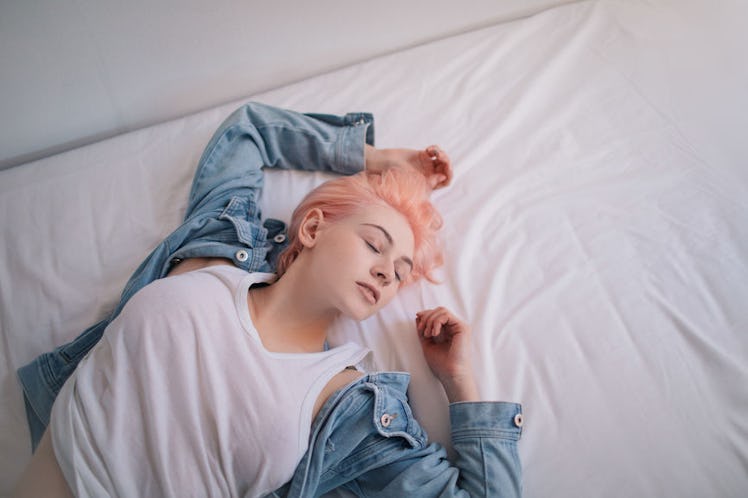
Sleep Experts Reveal Whether Naps Can Actually Make Up For Lost Shut-Eye
When your weekdays are packed to the brim with to-dos, you don't have the luxury of turning off your alarm and sleeping as late as you want on a random Tuesday morning. It’s unfortunate, but #adultlife just doesn’t always allot six to eight hours of shut-eye — or so it seems. I’ll let you in on a little secret, though: There’s this beautiful thing called a nap — maybe you’ve heard of it — where you take a snooze in the middle of the day to catch some quick Zs. But can naps make up for lost sleep? In theory, putting the day on pause to snooze and recoup sounds like an excellent solution to exhaustion, but are you better off pushing through the day on a mere six hours of sleep? Science may or may not have the answer.
According to the National Sleep Foundation’s guidelines, it’s suggested that adults between the ages of 18 and 64 years old clock in anywhere from seven to nine hours of sleep every night. Did you just actually LOL at that statement? Because I sure did. Personally, I’m lucky if I clock in seven hours of sleep; for me, nine hours of uninterrupted sleep on a weeknight sounds like a literal dream. If you’re juggling work, classes, a social life, all while trying to save at least an hour for yourself, I’m sure you can probably relate. Ironic as it sounds, considering sleep is one of the most important parts of self-care, there just aren’t enough hours in the day to do it all and meet these requirements — or are there?
To find out whether naps can actually make up for lost sleep, or if you’re better off trying your best to reserve those golden seven to nine hours for nighttime only, researchers from Duke-NUS Medical School analyzed the differences between split sleep and continuous sleep, and how both affect your brain functionality and blood sugar levels. For the experiment, per Duke-NUS Medical School's official press release, students between the ages of 15 and 19 were instructed to either clock in six and a half hours of continuous sleep, or split up that time with five hours of sleeping at night, paired with an hour and a half nap during the week.
According to the study’s findings, which have been published in the medical journal Sleep, students who slept for five hours and napped during the day said they experienced less exhaustion, higher brain functionality, and were in a more positive mood than students who slept the full six and a half hours throughout the night. However, participants who split their sleep did experience a spike in blood sugar levels, which could become a potential issue later in life if you were to make this a habit, according to the research.
Professor Michael Chee, director of the Centre for Cognitive Neuroscience at the university and one of the study's senior authors, said in a statement for the press release that, while these findings are certainly fascinating, “compared to being able to sleep 9 hours a night, having only 6.5 hours to sleep in 24 hours degrades performance and mood.” In other words, getting less sleep at night, but compensating for the lack of shut-eye with a catnap, can be beneficial for someone who's already meeting the bare minimum of sleep, but obviously, getting a solid seven to nine hours is best-case-scenario.
In short, if you struggle to meet those seven to nine hours of sleep every night, clearly napping can yield some benefits. However, Chris Brantner, certified sleep coach at SleepZoo.com, tells Elite Daily that, while research has shown time and again that naps can result in mental clarity and better performance in the workplace, this particular study didn’t focus on a traditional “power nap,” which generally takes up about 20 to 30 minutes of your day. Instead, the experiment required split-sleepers to take a 90-minute nap to “match up perfectly with how long it takes on average to get through a complete sleep cycle,” Brantner (who was not involved in the research) noted.
“People waking up groggy from naps are experiencing sleep inertia, which typically occurs when waking up at the wrong point of a sleep cycle... at say one hour in,” Brantner explains. “That means you're likely being awakened from deep sleep, so you feel groggy.” Translation: The study’s drawn-out nap isn’t ideal for everyone.
So where’s the happy medium? Well, if you’re going to nap, Dr. Roy Raymann, resident sleep expert and vice president of sleep science and scientific affairs at SleepScore Labs, tells Elite Daily the best time of day to schedule snooze time would be between 2 p.m. and 3 p.m., as the post-lunch dip in blood sugar levels will likely cause you to feel sleepy. Additionally, he recommends aiming to sleep for a good 20 to 30 minutes max, so you can avoid that icky groggy feeling Brantner mentioned.
In general, though, Rob Bent, co-founder and chief product officer of SOM SLEEP, only recommends split-sleeping if you know for a fact that you'll be short-slept for a week or less, and you can make up the difference with a long nap in the early afternoon.
“For almost all situations, the best answer is to sleep as much as possible at night and aim for eight or more hours of uninterrupted sleep,” Benton tells Elite Daily. “Short sleep will not provide the same benefits as a full night's sleep, regardless of whether it comes in one or two periods throughout the 24-hour cycle.”